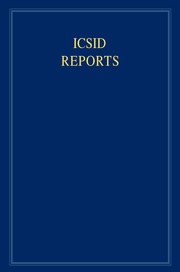No CrossRef data available.
Article contents
Beijing Urban Construction Group Co. Ltd v. Republic of Yemen
Published online by Cambridge University Press: 06 July 2022
Abstract
Jurisdiction – Foreign investor – State-owned entity – ICSID Convention, Article 25(1) – Interpretation – Broches test – ILC Articles on State Responsibility – Whether a State-owned entity operating as an ordinary commercial entity was “a national of another Contracting State” under Article 25(1) of the ICSID Convention – Whether the application of the Broches test requires a context-specific analysis of the commercial functions of the investment
Jurisdiction – Foreign investor – Legality – Interpretation – Municipal law – Whether an investor needed to register its investment under municipal law as a condition precedent for treaty protection
Jurisdiction – Expropriation – Interpretation – Dispute – Consent – Whether the State had consented to ICSID arbitration in respect not only of the quantum of expropriation claims but also liability for expropriation
Jurisdiction – Most-favoured-nation treatment – Interpretation – Dispute resolution – Territory – Whether the standard of most-favoured-nation treatment in the State’s territory allowed an investor to rely on dispute resolution provisions contained in another BIT of the State
Jurisdiction – Investment – Interpretation – ICSID Convention, Article 25 – Salini test – Whether the definition of investment in a BIT exceeded what is permissible under the ICSID Convention – Whether a construction contract met the requirements of the Salini test
Jurisdiction – Contract – Expropriation – Whether the involvement of military forces distinguished the alleged expropriation from a purely contractual claim
Keywords
- Type
- Case Report
- Information
- Copyright
- © Cambridge University Press 2022


